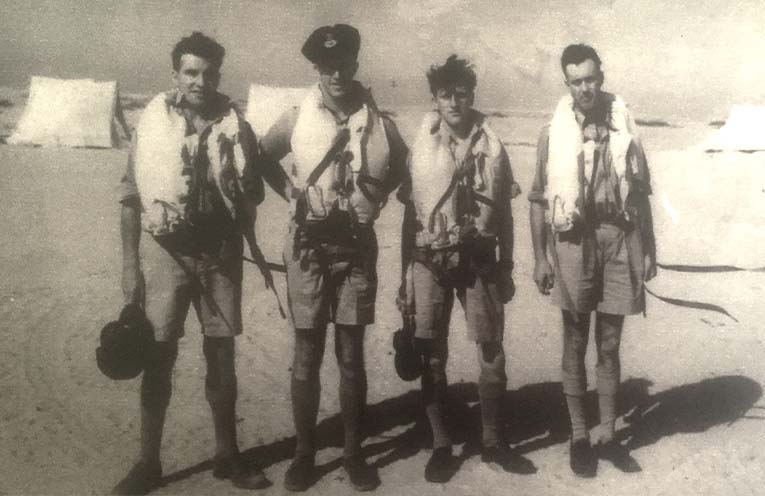
FAMILY research can take us on an interesting journey – usually when we are older and there is more time to wonder about our forebears.
Why did they go their different ways?
With ANZAC Day approaching, I look back at the effect of the Second World War, for instance.
My Grandfather was the manager of the Allen Taylor timber mill at Winda Woppa, with three of his four sons also employed there.
The three were married and their parents had helped them into houses they were then paying back as they all needed that help during the Great Depression of the thirties. They must have thought life was looking positive.
Their youngest brother had attended Newcastle Boys’ High School and was employed in the management section of Commonwealth Steel.
When the war broke out the pressure was on to join up or to do something towards helping the situation.
Uncle Neill moved to Newcastle and was employed at Commonwealth Steel as a boiler-maker.
He also became a member of the Volunteer Coastal Watch group.
Uncle Bill and Aunt Edna (née Ripley) moved to Williamtown where they had a dairy farm producing food for the war effort.
My father Jack also produced food, becoming an oyster farmer.
Post-war he started his own bush timber mill and remained in Tea Gardens.
Their sister, Lillian, had married Richard Valentine Amiss, an Englishman, and returned to England with him in 1934 when his family needed him to run their business.
After the war broke out their premises were closed for the duration and both of them worked in factories for the war effort.
Uncle Allen resigned from his Commonwealth Steel job to join the R.A.A.F.in June 1941. He became part of the 459 Squadron.
By January 1942 he was training in Rhodesia (Zimbabwe) and in 1943 was listed as being in the Middle East/Italy region.
It seems strange to have a photo of Allen and his crew taken in what is obviously the desert.
However in a letter to his parents, from the very vague address RAAF Headquarters, Middle East and dated 16 May 1943, he writes, “At the moment I am on the edge of the desert with plenty of sand and flies – we have not had a dust storm for some considerable time now but when the dust blows up you eat sand, breathe, digest it – well it is not very nice anyway, as for the flies it is hard to say which is worse between them and the sand.
“We do get a break from the sand but these little black so and so’s are present the whole time – That is a big enough moan for the moment, I think… Well, folks, I will have to draw this very short letter to a close now but I thought I had better let you know I am still stamping around this little old lump of turf, sand or what you will?
“Give my regards to the folks at home whom I hope with yourselves are in the best of health and enjoying life as much as possible in these trying times.
“So long, look after yourselves and all the best, your loving brother Allen.”
Further information comes from an article in the Dungog Chronicle on Friday 7 January,1944, titled ‘Newcastle Airman Helped In Rescue’.
‘The Minister for Air (Mr. Drakeford) announced details of the part played by a Newcastle airman, Flying Officer Allen Ringland, in the rescue of occupants of a. dinghy off the Dodocanese Islands.
‘Ringland was captain of a plane, attached to. an Australian naval cooperation squadron.
‘While on reconnaissance over the Dodocanese, he and his crew sighted distress lights from a dinghy on the sea.
‘They ‘pin-pointed’ the position; then flew back to two Swedish relief ships which they had passed earlier in the night.
‘Although the Australians did not know whether the dinghy contained friend or foe, they signalled the position to the Swedish vessels and continued to circle the ships until they saw them alter course to pick up the survivors.
‘The crew then completed the reconnaissance.
‘Flying Officer Ringland is a son of Mr. and Mrs. W. Ringland, of Tea Gardens.’
Allen didn’t make it home.
He and his crew were reported missing at sea ten miles off Cape Gata, Cyprus on 3 March, 1944.
The plane, a Ventura MK5, was never found and their deaths are commemorated in Egypt in the Alamein War Cemetery maintained by the Commonwealth War Graves Commission.
The Air Forces panels there commemorate more than 3,000 airmen of the Commonwealth who died in the campaigns in Egypt, Libya, Syria, Lebanon, Iraq, Greece, Crete and the Aegean, Ethiopia, Eritrea and the Somalilands, the Sudan, East Africa, Aden and Madagascar, who have no known grave.
He was only 25.
The First World War had already affected my Mother’s family.
Two of her brothers (she was the youngest of 8) served in the Army, and the oldest, William Ward, lost a leg in the trenches at Gallipoli.
Lest we forget – not just those who served, but those whose lives were changed as the result of war.
This may be a major factor in your family’s story.
By Anne JOHNSON, Tea Gardens Family Research and Local History Inc.
